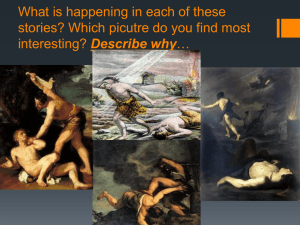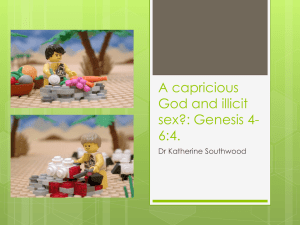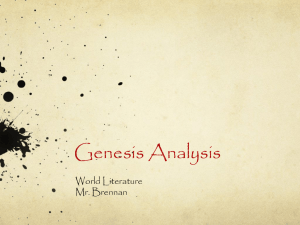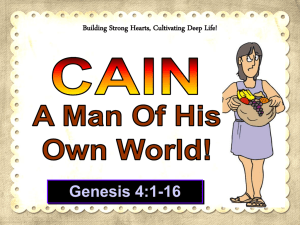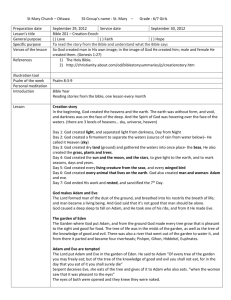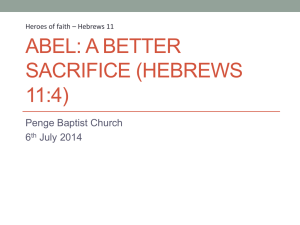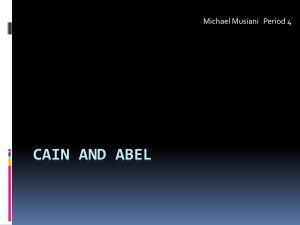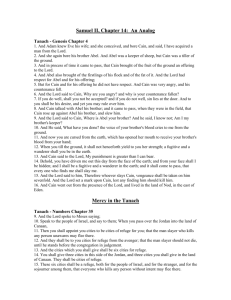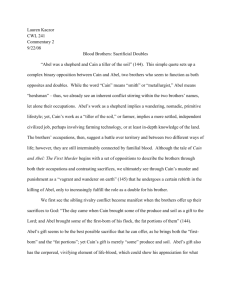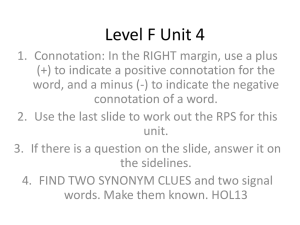CHAPTER 7 The Hope of New Adam Cain and Abel
advertisement
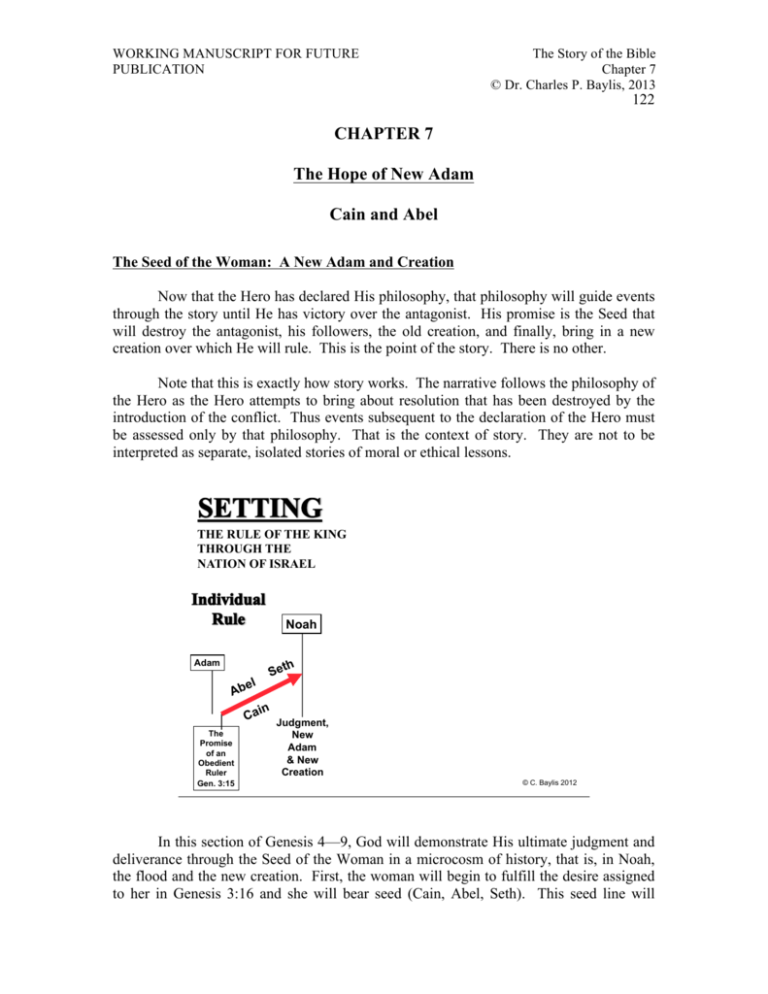
WORKING MANUSCRIPT FOR FUTURE PUBLICATION The Story of the Bible Chapter 7 © Dr. Charles P. Baylis, 2013 122 CHAPTER 7 The Hope of New Adam Cain and Abel The Seed of the Woman: A New Adam and Creation Now that the Hero has declared His philosophy, that philosophy will guide events through the story until He has victory over the antagonist. His promise is the Seed that will destroy the antagonist, his followers, the old creation, and finally, bring in a new creation over which He will rule. This is the point of the story. There is no other. Note that this is exactly how story works. The narrative follows the philosophy of the Hero as the Hero attempts to bring about resolution that has been destroyed by the introduction of the conflict. Thus events subsequent to the declaration of the Hero must be assessed only by that philosophy. That is the context of story. They are not to be interpreted as separate, isolated stories of moral or ethical lessons. THE RULE OF THE KING THROUGH THE NATION OF ISRAEL Noah Adam h A Ca The Promise of an Obedient Ruler Gen. 3:15 Set bel in Judgment, New Adam & New Creation © C. Baylis 2012 In this section of Genesis 4—9, God will demonstrate His ultimate judgment and deliverance through the Seed of the Woman in a microcosm of history, that is, in Noah, the flood and the new creation. First, the woman will begin to fulfill the desire assigned to her in Genesis 3:16 and she will bear seed (Cain, Abel, Seth). This seed line will WORKING MANUSCRIPT FOR FUTURE PUBLICATION The Story of the Bible Chapter 7 © Dr. Charles P. Baylis, 2013 123 continue to Noah. Noah, as prophesied in Genesis 3:15, will implement judgment on all of the seed of the serpent and then rule over a new creation. But, following that fulfillment, he will demonstrate quickly that he is not the intended One as he duplicates the sin of Adam by “eating the fruit” of the vine and becoming “naked and ashamed.” Genesis 4: Cain and Abel – The desire of the woman for her Man (the “Seed of the Woman”) will bring her sorrow due to “enmity between the seed of the serpent and the Seed of the woman” (3:15-16). This section begins with the story of Cain and Abel. It directly illustrates what has just been prophesied. Genesis 3:15 prophesied the Seed of the Woman who would deliver mankind, but would be opposed by the followers of the serpent. Genesis 3:16 prophesied that this woman would have sorrow since some of her children would follow the Messiah and some the serpent, yet she would hope to bring forth the Messiah. The story is in typical narrative format. It is introduced by the woman’s spoken hope and ended with her spoken conclusion and renewed hope (compare 4:1 with 4:25). She suggests at the beginning that Cain might be the “Seed” and concludes by saying at the end of the story the sorrow that she has because he was not. Following her statement of hope in 4:1, the body of the story then plays out to see if Cain fulfills the prophecy of the One to come in 3:15-21. It is very quickly seen that he does not represent God as required, is rejected, and the hope continued in Seth. In short, Cain illustrates the “seed of the serpent,” who persecutes and kills the follower of the “Seed of the woman,” Abel. Gen. 4 Story: Philosophy: The Hero Provides the Hope of Seed (4:1-2) God moves in 4:1 to implement the bringing forth of His Seed through the bearing of children. The story begins with the man and the woman coming together in “one flesh” (2:24) and bearing two children. Now the man had relations with his wife Eve, and she conceived and gave birth to Cain . . .“ (Genesis 4:1a) 2 Again, she gave birth to his brother Abel. (Genesis 4:2) Gen. 4: The Hero’s Philosophy repeated by the Woman (4:1) Eve names her firstborn Cain, or “Gotten One”, as she states she has “gotten a man , YHWH2.” When she gives the Name, “YHWH,” she is actually giving him a 1 1 The term used here is אישׁ, ֖ ִ which relates her statement to 3:16 where her desire was for her “ ”אישׁ, ֖ ִ who would be her Ruler. WORKING MANUSCRIPT FOR FUTURE PUBLICATION The Story of the Bible Chapter 7 © Dr. Charles P. Baylis, 2013 124 2 The literal Hebrew here is, “I have gotten a man, YHWH”. Some of the variations of interpretation suggested are: • “like YHWH:” (Eve bore a child similar to YHWH who had created man.) • “with the help of YHWH:” (YHWH had enabled her to bear a child.) • “YHWH:” (The child was YHWH Himself.) • “YHWH:” (The child was the representative of YHWH, since sons (images) are sometimes referenced by name to their father). The latter choice reflects the language of the text and the expectation of the promise of 3:15-24 (recall Adam re-named his wife, “life” as his expectation of Messiah as coming from her.) Eve was not “life” but had “life” within her in the Seed (3:16)). Eve hoped she had born the fulfillment of the promise of 3:15, the human Representative of God. The statement of the woman, “I have born a man, YHWH” is important. The literal Hebrew has a marker, ֶאת, in front of YHWH and it reads, “I have born a man, “ ֶאתYHWH.” This marker is most frequently used as the direct object of the verb, or in apposition, as in naming. This can be seen in the following context as in “she again gave birth to his brother, ( ) ֶאתCain.” If one simply follows the use of this marker throughout the chapter it is noticed that it prefaces all of the naming done by Eve (Cain in 4:1, Abel in 4:2, Seth in 4:25, as well as Enosh in 4:26). Thus it appears in the immediate context that there is no evidence for making ( ֶאתin front of YHWH) different from naming (apposition) in some sense (cf. also 4:17, 18, 20, and 22 for its use before other names). In fact, one has to leave the immediate context to find any use of this Hebrew marker as anything other than a direct object marker or in apposition for naming. Word Biblical Commentary admits that translations other than direct object or appositional naming are difficult, yet still translates the phrase by stating, ““ ”קניתי אישׁ את יהוהI have gained a man with the LORD’s help.” He states, “Every word of this little sentence is difficult” (von Rad, 103). First, there is the problem of the meaning of “ הנקgain.” Then, it is peculiar to call a baby boy “a man.” Finally, the last phrase, הוהי תא, is very strange. Is אתthe definite object marker? In that case we ought to translate “I have acquired a man the LORD.” Or is it a preposition that normally means “with,” as our translation assumes?” (Genesis 4:1-2, Comment, Word Biblical Commentary, “Genesis 1—15”, Wenham, Gordon J.). Note also in this commentary that they seem to readily admit that the normal reading is to have it as an object marker. They deal with other possibilities but recognize their difficulty from its expected translation as a direct object or apposition. They justify their translation against their better judgment due to the interpretation that they have decided fits best. For instance, their comment on the frequent translation of “with the help of” is stated as: “On the other hand, it is also unparalleled for תאto mean “with the help of.”” Note that in Jeremiah 23:5-6 the Davidic Seed is called YHWH. 5 "Behold, the days are coming," declares the LORD, "When I shall raise up for David a righteous Branch; And He will reign as king and act wisely And do justice and righteousness in the land. 6 "In His days Judah will be saved, And Israel will dwell securely; And this is His name by which He will be called, 'The LORD our righteousness.' (Jeremiah 23:5-6) WORKING MANUSCRIPT FOR FUTURE PUBLICATION The Story of the Bible Chapter 7 © Dr. Charles P. Baylis, 2013 125 second name. She is naming him YHWH by calling his name the same as the One he is to represent (e.g., son as the “obedient image” of the father). So, just as 3:15-16 promised, God is moving to overcome the serpent by providing a seed. The translation reads that the man knew Eve, his wife, and she bore Cain.” (direct object of “bore”). Then it reads that she said, I have born a man, “ ֶאתYHWH”. This appears to be in apposition to “man,” thus naming. In other words if the “man” is removed, it would look the same as the former statement regarding the birthing of Cain. “I have born YHWH.” Thus the statement looks like the re-naming, or adding of a second name, of the “man” (Cain). If one looks at the next statement where Eve bears Abel, it says she gave birth to his brother, "ת־הבֶל ֑ ָ " ֶא. Here Abel is prefaced by the marker ֶאתand thus appears to be in apposition to “his brother,” or giving his brother a name. If, once more, like in the previous verse, the “his brother” is removed, one would have it acting as simply a direct object meaning, she had given birth to Abel, thus again naming. The renaming of Cain as YHWH is simply indicating that Cain is to be YHWH’s representative and thus carries the Name. This can be seen throughout the Old Testament. In Ezekiel the references to David appear not to be that David will himself be the 'King,' but the ultimate David, Christ. In Malachi, Elijah is prophesied to come, but it is not Elijah, himself, who comes, but one who is represents Elijah, and thus comes in his name. Note also the progress of the story from Eve’s anticipation of the Seed in expressing this hope (4:1) to the end of the story (4:25). Eve’s hope is based on Genesis 3:15, i.e., faith. However, her hope is not to come in Cain. Eve states that she has "gotten" a man. Whenever this exact form is used in the Old Testament (first person) it is used in the sense of "acquire" or "redeem" ("bought"). In its form it is never used as totally one-sided but is usually used in the sense of giving up of something for something else. It would appear that Eve is not saying this is the gracious provision of YHWH, but that she in some way has, through her own efforts, brought forth this hope. By contrast when Seth is born she states that God has appointed ( )שֽׁת ָ her another seed and states that he is in place of Abel, the obedient one. There is a movement of Eve from the recognition of physical seed as the fulfillment of the promise to the obedient seed (Abel) and now Seth (physical seed through whom the Obedient One would come). When Eve states that God has "put" or "appointed" Seth, it now carries recognition of the graciousness and her wrong perception of self-provision. Eve appears to have thought that the bearing of a physical seed was adequate for her prosperity, but through the story she realizes that physical seed is not enough. It must be obedient. This is the same struggle that is found in the patriarchs, Abraham, Isaac, and Jacob as well as the 11 brothers. Thus, Genesis 4 is not just a story of how Cain was not the one, but how Eve came to a understanding of God’s promise, that God would provide and appoint and it would be in His own time and through His gracious provision, not hers. WORKING MANUSCRIPT FOR FUTURE PUBLICATION The Story of the Bible Chapter 7 © Dr. Charles P. Baylis, 2013 126 Gen.4: Rising Action: The seed of the serpent (Cain) and the righteous seed (Abel3) “A father had two sons.” That short sentence is repeated throughout Scripture. The literary point is to contrast the two. Contrasts show up in Cain and Abel, Isaac and Ishmael, Jacob and Esau, as well as the younger and elder son of Luke 15. Since the prophecy of the seed of the serpent and the Seed of the woman (3:15) and the fact that the woman would bear both (3:16), the reader can predict that one will follow the serpent and the other will follow God. Further, literarily the expected difference is also obvious. One will act from sight and human reasoning like Eve did and will be the follower of the serpent. The other will listen to God’s revelation, Genesis 3:15-21, the prophecy of the New Adam, the Deliverer, the Substitute, and will be a follower of the Seed of the Woman. In addition, from 3:16, the woman was to suffer “sorrow” in the bearing of these children. In fact the repetition of the two words, “conceived” and “bore” from 3:16 links this verse, 4:1, with 3:16 literarily, as well as the fact that she bore “sons”.4 She would either be sad because they followed the serpent, or be sad that, since they had followed the prophecy of the obedient Seed, they would be persecuted and killed. The story of Cain and Abel continues predictably on a course already determined by context and the promise of Genesis 3:15-21. The Contrasting Response of the two Sons to the Promise Predictably and literarily the two sons will be diametrically opposed. Each of the details of the story that are included will represent opposite characteristics as regards the theme, that of following the serpent or following God. 3 Abel’s name means “vapor” or “breath”. There was thus a prediction that his life was a breath since life was now no longer guaranteed. Thus in Abel’s name there is the recognition of the limited time and the fateful death knell of the curse. Note also the use of the same term in Ecclesiastes, which is normally translated “vanity.” The connection of Ecclesiastes to Genesis 1—4 is clear. Once the curse entered the world, all one can see (“under the sun”) is vanity (breath, vapor) and fades away. 4 “Linguistic And Thematic Links Between Genesis 4:1-16 And Genesis 2—3”, Alan J. Hauser, JETS 23/4 (December 1980) 297-305 WORKING MANUSCRIPT FOR FUTURE PUBLICATION The Story of the Bible Chapter 7 © Dr. Charles P. Baylis, 2013 127 CAIN% ABEL% Tiller%of%the%ground% Keeper%of%flocks% Sacrificed%fruit% Sacrificed%sheep% Firstborns%&%fat% GOD%had%NO%regard% GOD%HAD%REGARD% The Content of the Sacrifices (Fruit vs. Sheep). Cain had chosen to overcome the curse of the ground (3:17) by bringing forth fruit5. Abel had chosen to raise animals. Up to this point animals were used only in sacrifice for symbolic coverings for sin as seen in 3:21. This sacrifice anticipated the Seed of the Woman who would remove the curse of the ground. These are interesting contrasts as their very identities are, either overcoming the curse of the ground through physical labor, or anticipating the Seed of the Woman who would overcome it and remove it.6 It is frequently interpreted that these both are “thank offerings7” and thus of no significant difference before God. Yet Cain gives what seems “humanly reasonable,” 5 Augustine stated, “He was followed by Abel, whom the elder brother slew, and who was the first to show by a kind of foreshadowing of the sojourning city of God, what iniquitous persecutions that city would suffer at the hands of wicked and, as it were, earth-born men, who love their earthly origin, and delight in the earthly happiness of the earthly city.” [City of God, 15.15]). 6 Lamech, Noah’s father, sees the removal of the curse of the ground as a Messianic function in 5:29. Noah’s physical career is not mentioned. He refers to both 3:17 and 3:15 that the Messiah will come and take away the curse. The question of their careers is interesting. Recall that the text only deals with responses to the promise. At this point there are those who pursue earthly deliverance and those who look for the Messiah and the new earth. Their careers are not what is mentioned here, but their identity, their hope. Abel appears to be following God while Cain follows prosperity on the earth through work to overcome the curse. Animals were not to be eaten until Genesis 9 so Abel was not raising them for food. Thus sacrifice was the only use of animals at this point. One could postulate that they were used for clothing, but the clothing of Genesis 3:21 was as a covering for sin, not from the weather. Note that Adam and Eve’s coats of vegetables were also not made to help against the weather, but as an attempt as a covering for sin. Thus Abel is heavily invested in providing symbolic coverings for sin. 7 It might appear to the reader that they are both bringing forth from the bounty produced as a result of their respective careers (although this requires a clear separation from what went on in Genesis 3). So it is suggested that these sacrifices were both “thank” offerings (for their food) and thus both were legitimate approaches to God. The basis of this view is that the word for “offering” is minkah, (lit.: “grain offering”), which later is used for “thank” offerings of WORKING MANUSCRIPT FOR FUTURE PUBLICATION The Story of the Bible Chapter 7 © Dr. Charles P. Baylis, 2013 128 that is to give from what one’s career produces (his works). Yet the context is clear that everyone is measured by what God “sees” as good, and that is revelation. So the question is, how has Cain responded to the revelation? Revelation (Faith) vs. Human Reasoning (Sight). The literary question proposed by the author is which son is going to follow YHWH’s revelation to relate to Him according to His promise of the Seed? Cain’s career and his offering have nothing to do with the hope that God has presented. Abel’s, on the other hand, cannot be connected to anything except God’s promise in 3:15 and its illustration in 3:21 (since animals had no other contextual function but to provide skin for covering). The contextual argument here is that one’s relationship to God is based on the response to His revelation. Adam and Eve had rejected the revelation of God and the relationship with God had been destroyed. The only question for Cain and Abel is whether they will relate to God through His self-revelation. The Book of Hebrews relates exactly this as it says Abel’s sacrifice was by faith (acting on God’s revelation). 4 By faith8 Abel offered to God a better sacrifice than Cain . . . (Hebrews 11:4a) In following the sequence from Genesis 3, it is not as though God gave a mild mannered sermon in Genesis 3 about the choice of death and life and everyone went vegetables. The difficulty with this is that the word minkah is almost never used for meat offerings and thus if applied as a “thank” offering would question Abel’s case, particularly since Abel is not raising the animals for food and thus the question of why he would give a “thank” offering if it was not providing him with some sustenance or bounty. Since the word is used here for Abel’s sacrifice of meat as well as Cain’s grain offering it must be used in the general sense (else Abel’s meat offering would not comply). In addition, the word for “firstlings” is really the word “firstborns,” which is never a “thank” offering but is used for substitutionary offerings. This is the “minkah” offering, which TDOT states is normally a grain offering with the essence of tribute attached to it. If the ‘tribute’ is important here then Cain is acknowledging God as Creator or King of the universe. In Genesis it is always in the form of a ‘present’, usually to appease the wrath of one who is a superior in authority (Pharoah or Joseph as ruler or Esau over Jacob), perhaps in the nature of a ‘bribe’. Thus the sacrifice would be a payment to God (for sin?). This would not be out of line as Cain would try to pay God from his own efforts, while Abel would be doing it through the blood of an animal that would clearly picture the Messiah to come. 8 Recall that “faith” is always acting on a revelation of God, His character, His promises, His desires. WORKING MANUSCRIPT FOR FUTURE PUBLICATION The Story of the Bible Chapter 7 © Dr. Charles P. Baylis, 2013 129 home to ponder their careers as if it was just another day. Genesis 3 leaves one with fearful, impending doom. The only hope from this dark cloud hovering over mankind is the provision for escape in the appearance of the Seed. The intensity is deafening as one enters Genesis 4. Cain’s Sacrifice of Vegetables: Following His Father’s Human Wisdom: Until Adam invented clothing to cover sin as a new use for vegetables, they were only used for food for man and animals. Adam, following his sin, using his human wisdom invented leaves for clothing. In attempting to approach God through what seemed “reasonable,” Adam had covered himself, and hopefully his sin, with greenery. Now Cain similarly offers vegetables to establish a relationship with God. Yet Cain is not responding to any revelation of God. The only trace of source is his father’s use of vegetables to attempt to continue a relationship to God. Cain follows the serpent by rejecting the revelation of God in 3:15, 21 as to how the relationship should be maintained. In addition, Cain now represents, not only the serpent, but also his father and mother’s error, whose source was the serpent. Cain’s act, in short, claims righteousness derived from his own depraved mind, his works, normally called “self-righteousness.” A Sacrifice of Sheep: Following His Father’s Desires in 3:21. The only use of animals up this point is for sacrifice as God did in 3:21. There the point was not to clothe Adam and Eve against the elements (there was no need indicated since the weather had not gotten colder nor more foreboding). The specific sacrifice was to illustrate God’s provision of The Seed of 3:15 and His unjust death at the hands of the serpent to substitute for their sins. Thus, Abel is raising sheep. There is no other use in the context except for sacrifice and Abel is doing just that. He is acting in accordance with the revelation of God. Hebrews states that the issue is a response of faith to God’s revelation. 4 By faith9 Abel offered to God a better sacrifice than Cain . . . (Hebrews 11:4a) The epistle of 1 John declares that Abel’s “deeds” were righteous. Abel did no “deeds” in Genesis except for his sacrifice. It was his only deed. That deed is declared to be righteous, or to be in accordance with God’s revealed character (“God saw”). Cain’s were “evil” or following the direction of Satan. 9 Recall that “faith” is always acting on a revelation of God, His character, His promises, His desires. WORKING MANUSCRIPT FOR FUTURE PUBLICATION The Story of the Bible Chapter 7 © Dr. Charles P. Baylis, 2013 130 12 not as Cain, who was of the evil one and slew his brother. And for what reason did he slay him? Because his deeds were evil10, and his brother's were righteous11. (1 John 3:12) The Specifics of the Sacrifices (“Firstborns & Fat”). For Cain there are no specifics given of his sacrifice. It was simply the fruit of the ground12. However, in Abel’s case, there are specifics given. The reason for this was not to show intensity, but because it was a correct sacrifice, it had specifics and these specifics indicated the nature of Abel’s sacrifice. “Firstborns.” The word used here, typically translated “firstlings,” is the word for “firstborn.” It is here used in the plural and should be “firstborns13.” The firstborn sacrifice was always substitutionary and is validated later in the Exodus where the firstborn belonged to God since God had not taken the firstborn of the Israelites as He did with the Egyptians. Thus the indication of “firstborns” is that this was a substitutionary offering like God’s previous example, and was not in the category of a “thank” offering. In fact, throughout the text when “firstborns” is used it is always in the nature of the eldest son in Israel and the substitution for him. “Fat Parts.” The fat parts (could be translated “best parts”) in meat offerings in later writings were the parts always allocated only to YHWH. The priest was not to eat of them, and in fact, Eli’s sons were under a death sentence for doing exactly that. Again, Abel is doing a substitutionary offering. Note that one did not eat meat until Genesis 9. 10 According to 1 John, what was Cain’s evil “deed?” It had to precede his murderous deed, which only leaves his sacrifice. Thus according to 1 John Cain’s evil deed was his vegetable sacrifice. 11 What was Abel’s righteous “deed”? There is no other deed recorded for Abel except for his sacrifice. It was righteous. 12 This is simply because it was the wrong action. As such there were no specifics since it was not according to God’s revelation. In other words it does not need to detail multiple things that Cain did wrong, since it was one thing; rejection of the revelation. 13 One ponders why the translators use “firstlings” instead of “firstborns.” It appears as though they thought errantly that Abel’s (and Cain’s) sacrifice were “thank offerings.” Thus “firstlings” sounds more like the best (e.g., “first” as “best”), which could apply to a “thank” offering. But that is not the case. The firstborns of animals were never a “thank” offering. WORKING MANUSCRIPT FOR FUTURE PUBLICATION The Story of the Bible Chapter 7 © Dr. Charles P. Baylis, 2013 131 God judges Cain based on God’s Philosophy (3:15) And the LORD had regard for Abel and for his offering; 5 but for Cain and for his offering He had no regard. (Genesis 4:4-5) Cain’s offering, not according to God’s self-revelation, is rejected. Abel’s, which conformed to God’s specific revelation, is accepted. Note that God’s specific revelation is of the Messiah, and Abel’s hope thus is reflected in Messiah to come. Cain thus denies that hope and is cursed. Hebrews is clear that Abel had acted on a prior revelation of God (“by faith”). Cain’s downfall was clearly by the fact that he did not offer a sacrifice “by faith” and was thus dealing with sight and his human wisdom. 4 By faith Abel offered to God a better sacrifice than Cain, through which he obtained the testimony that he was righteous, God testifying about his gifts, and through faith, though he is dead, he still speaks14. (Hebrews 11:4) The Conflict: Cain rejects God (3:15) The story of Cain now moves to a new phase, that of Cain rejecting his position as representative of God. He will identify quickly with the serpent of Genesis 3:15, choosing not only to reject God but also, as predicted in 3:15, to execute unjust judgment on the representative of God, Abel. Cain Judges God as Wrong (Evil) Now having had his offering rejected by God (note here that God is known by His revelation), Cain is “angry.” Anger is an expression of the judgment by one’s own value system. In other words, Cain has judged God and as a result is angry with God, since he does not feel that God has assessed things correctly (Cain “sees” vs. God “sees”).15 14 Abel still speaks to the reader of the text. He suffered and died identifying with Messiah at the hands of the enemies of the Christ. Hebrews is urging believers to listen to the voice of Abel (who never spoke in Genesis) as he speaks through his deed of faith in the Seed. 15 Note here the similarity to Jonah (“Jonah was angry”) and the Story of the Lost Son in Luke 15 (the elder son became “angry”). Note also that in both cases, like in the story of Cain, God, or the father, approaches the “angry” one (Jonah or the elder son in Luke 15) to offer and explain His mercy toward the other. WORKING MANUSCRIPT FOR FUTURE PUBLICATION The Story of the Bible Chapter 7 © Dr. Charles P. Baylis, 2013 132 God Character offers Mercy to Cain God now confronts Cain16 and explains to him that he must conform to God’s revealed character. God expresses His character in mercy to Cain to overcome his error (“if you do good”). Note that when God expresses mercy it is not some new invention, tailored specifically for Cain, but exactly the same as what God had expressed in Genesis 3:15, indicated by the sacrifice of the animal, and imitated by his brother, Abel. This was what Cain had rejected, yet God offered mercy to Cain, based on His revelation of Messiah to come. In the Book of Jude, Jude notes that the characters that he is encountering are just like Cain. They are rejecters of the revelation and have entered the assembly of believers and are convincing them to operate based on human wisdom instead of revelation. Jude states, 11 Woe to them! For they have gone the way of Cain, (Jude 1:11) Then Jude states that in the same way God offered rejecting Cain mercy from the revelation, Jude exhorts the believers to offer the antagonistic false teachers the same. 23 save others, snatching them out of the fire; and on some have mercy with fear, hating even the garment polluted by the flesh. (Jude 1:23) Cain simply must accept mercy indicated by offering the correct sacrifice (which was asking for God’s mercy in the coming Messiah), as Abel did. God’s character cannot be dismissed if one wants to live. "If you do well (lit.: “good”), will not your countenance be lifted up? And if you do not do well, sin is crouching at the door; and its desire is for you, but you must master it." (Genesis 4:7) The word God uses for “well” is the word tov (lit.: “good”). This reflects back to when God “saw that it was good.” In other words, Cain had to conform to God’s character, which was “good.” Nothing else was acceptable. If Cain did not see himself as needing this mercy (reflected in the animal sacrifice), then there was no hope for Cain. 16 In addition to the reference in Jude, there is a similarity to Jonah and also to the Lost Son in Luke 15. In each case, the errant one thinks he is righteous in his own works (Cain, Jonah, the elder son). Yet God, in His mercy approaches each one and extends mercy to them as He did to their counterpart (Abel, Ninevah, the younger son). They each reply with anger in a judgment against God’s value system which did not regard their self-works. In the Cain story, after God confronts him, he rejects God by killing Abel. There is no reaction recorded by Jonah or the elder son. However, the persecution of the righteous (Abel) is assumed to continue by the Pharisitical types even into the Book of Acts until the return of Christ to execute judgment. WORKING MANUSCRIPT FOR FUTURE PUBLICATION The Story of the Bible Chapter 7 © Dr. Charles P. Baylis, 2013 133 Note: God judges Cain, not on some general moral code, but strictly on His revelation, that of His philosophy of Genesis 3:14-24, forgiveness for Cain through the future Messiah. Here Cain’s failure and his judgment were according to the revelation, the philosophy of Genesis 3:14-24. Cain was offered mercy through that coming Messiah (“if you do right . . . if you do not do right . . .”, i.e., represent the coming Messiah’s sacrifice as a covering for one’s sin). Satan Deceives Cain As the Satanically-driven serpent attempted to deceive Eve and overcome her, once again “sin” is crouching (lit.: “lying down”) at the door and his17 desire is for you.” Satan is ready to possess Cain as he did with his parents18. Cain’s choice is to be the “seed of the serpent” or follow God in the hope of the “Seed of the Woman.” Cain Acts as the Seed of the Serpent (Genesis 3:15) Cain “tells19” his brother Abel and moves to slay him. This is, of course, is the prophecy made in Genesis 3:15, that the serpent (and followers) would strike the Righteous One (and thus His followers). Now Cain is clearly identified as the serpent’s follower, contradicting his mother’s hope of 4:1. 17 The difficulty here is that this is a masculine, (lit.: “his”) while “sin” is a feminine. Thus, it appears that the masculine singular may be referring to the “serpent,” which is a masculine. 18 This interpretation given is the traditional one for this verse. However, the translation is somewhat problematic and may lead to alternate possibilities. The word for “sin” here is mostly (not always) translated as “sin offering” in the Pentateuch. The word for “crouching” is “lying”. And the word for “desire” or “longing” is suffixed with a “third person masculine” pronoun (“his”) while the word it has been assigned to traditionally, “sin” (or “sin offering”), is a feminine. The following clause also, “but you must rule over it” is similar to Genesis 3:16 where the phrase is “but he must rule “in” you.” The phrase here is “but you must rule “in” him (?)” where the pronoun is a third person masculine again and the preposition is “in.” Thus, literally, this would read, “sin (fem., “offering?”) is lying at the door (opening) and his (masc.) desire is for you, but you must rule in him.” The only place that a doorway or opening is mentioned along with this form of the “sin offering” is in Leviticus 12:6 and Zechariah 13:1 where it is a sinoffering given to the priest at the doorway of the tent of meeting. 19 Here Cain is duplicating his anger toward God by “telling” Abel that Abel is wrong and that his own self-righteousness is justified. He is persecuting him in a similar way as the Pharisees intimidated Jesus before killing Him. There will be a parallel to this when Ham “tells” his brothers about their father’s shame (9:22). Note also the theme of one’s speech reveals his character, thus it is Cain’s justification that is going on here. WORKING MANUSCRIPT FOR FUTURE PUBLICATION The Story of the Bible Chapter 7 © Dr. Charles P. Baylis, 2013 134 The Conflict: Cain slays the righteous one, Abel. As a prophecy fulfillment of 3:15, the seed of the serpent slays Abel, the righteous one. The Judgment: God Confronts Cain. As a parallel to Adam and Eve, when God comes on the scene and asks, “where are you?,” now God asks Cain where his brother is? Cain defends himself and reveals his character. Cain’s first answer to God’s inquiry reveals that he is the follower of the great liar, the serpent. He states a clear lie meant to deceive God, “I do not know.” Cain continues his response to God’s question with another question, “Am I my brother’s keeper?” meant to deter God from pursuing any requirement from his character. It is, like Adam and Eve’s statement of defense, “I was naked and ashamed so I hid”. This revealed their character. Adam and Eve had argued that their character was acting “reasonably” in hiding from God and covering themselves. Now Cain is arguing (with His Creator) that he does not have the responsibility of care for his brother, while hiding the fact that he has killed him. Note again that self-righteousness is trying to convince God (“God sees”) that it is right (“Cain sees”) when they are different. The answer to that question is that Cain actually was to be his brother’s keeper. The prophecy of 3:15 indicated that the New Adam, God’s Representative (i.e., Messiah) would give His life for sinful, cursed, humanity. In other words, the New Adam would love His brother enough that He would give His life for him. Thus, the Messiah was “His brother’s keeper.” If one followed the “Seed” and operated on His behalf, then he also would be “his brother’s keeper.” In commenting on this chapter in 1 John (a Cain and Abel context), the author restates that the character of Jesus Christ should be active in the follower. 14 We know that we have passed out of death into life, because we love the brethren. He who does not love abides in death. 15 Everyone who hates his brother is a murderer; and you know that no murderer has eternal life abiding in him. 16 We know love by this, that He laid down His life for us; and we ought to lay down our lives for the brethren. (1 John 3:14-16) Since the Messiah was the implementer of God’s desires, the Christ reflected the very character, the very sacrificial love of God. Thus God was also “His brother’s keeper.” Those who have the imputed character of God through belief in Jesus must also be their “brother’s keeper.” WORKING MANUSCRIPT FOR FUTURE PUBLICATION The Story of the Bible Chapter 7 © Dr. Charles P. Baylis, 2013 135 Cain’s argument with God reveals that he is not the follower of God’s heart, but the follower of the devil’s. New Testament Use: In Luke 10:25-37 the story of The Good Samaritan is told by Jesus in response to a lawyer’s inquiry, “who is my neighbor?” Jesus had just declared the two greatest commands, the second of which was to “love your neighbor as yourself.” (Note the similarity to being one’s brother’s keeper.”) In reply, Jesus tells him the story of the Good Samaritan. What is interesting is the question the lawyer had asked. Just like Cain’s response to God, the lawyer was seeking to deter the responsibility from his own character by asking, “who is my neighbor?” (i.e., “Am I my brother’s keeper?”) This would mean that the issue would be, “who is deserving of my beneficial help?” putting the responsibility on the worthiness of the one to be helped rather than on the character of the potential helper (the lawyer). Following the telling of the story, Jesus did not re-ask the same question as the lawyer had asked, i.e., “who was his (deserving) neighbor?” Jesus asked who was the neighbor to the man who had been robbed. Thus Jesus put the responsibility on the character of the lawyer as to whether he was being the “good” neighbor, and helping anyone in need? Thus the question of the lawyer was exactly the same as Cain’s “am I my brother’s keeper?” He asked, “who was his neighbor?” meaning that he was avoiding that the responsibility was in his own character. In both cases (Cain and the Lawyer), they were wrong since the Messiah, ultimately Jesus, was the great Neighbor (Genesis 3:15) who came to die for His brother. Thus God is the Great Neighbor of all as He sends His Son to be the Neighbor and to die for the brother. Thus man, as God’s representative, is to be a neighbor, and thus, his brother’s keeper. God’s Judgment on Cain: Death Delayed Just as Adam’s death had been delayed so that he could bring forth the Seed of the Woman, Cain’s death would be delayed so that he could bring forth more like himself, “seeds of the serpent”. Clearly these seeds of the serpent would be guided by sight (human wisdom), and in their self-centered Satanically-deceived ways they would attempt to be great in the sight of a cursed, dying world. John expresses exactly this in 1 John 2:15-17, which is a reference to Eve’s reasoning in Genesis 3 and would be duplicated by the followers of the serpent. WORKING MANUSCRIPT FOR FUTURE PUBLICATION The Story of the Bible Chapter 7 © Dr. Charles P. Baylis, 2013 136 15 Do not love the world nor the things in the world. If anyone loves the world, the love of the Father is not in him. 16 For all that is in the world, the lust of the flesh and the lust of the eyes and the boastful pride of life, is not from the Father, but is from the world. 17 The world is passing away, and also its lusts; but the one who does the will of God lives forever. (1 John 2:15-17) James discusses the same Satanically-sourced reasoning that is embraced, not only by the unsaved, but by believers who appear in James’ epistle (see James 2:1). 14 But if you have bitter jealousy and selfish ambition in your heart, do not be arrogant and so lie against the truth. 15 This wisdom is not that which comes down from above, but is earthly, natural, demonic. 16 For where jealousy and selfish ambition exist, there is disorder and every evil thing. (James 3:14-16) The Seed of Cain: Followers of the serpent As the chapter follows the seed (i.e., followers) of Cain, the narrator stops at times to note specific things about these men. The emphasis is on their earthly glory, their greatness in their own sight and the sight of men (“they saw . . . “), their desires to succeed in a dying world. Recall that everyone is measured by his response to the promise. This is not a book about casual observations of mankind, but a response to the revelation of “life” and “death.” Satan defines “life” as pursuit of gain in this dying world. God defines “life” as responding to His character (revelation) apart from the dying world. Enoch: Cain makes his son’s name great by building a city and naming it after him (4:17) Lamech: Cain’s great, great, great, grandson is known throughout the world as the one who takes vengeance on (judges) those who go against him. This is the nature of the seed of the serpent that takes vengeance on the righteous (3:15), but in either case vengeance was delayed by God and is the prerogative of God and His Messiah alone. It should also be noted that in Lamech’s rejection of God, he takes two wives, a clear violation of the “one flesh” of Genesis 2:24. Lamech’s sons: • Jabal: Name is great as a tentmaker and a shepherd WORKING MANUSCRIPT FOR FUTURE PUBLICATION The Story of the Bible Chapter 7 © Dr. Charles P. Baylis, 2013 137 • • Jubal: Name is great for his musical instruments, the pipe and the lyre Tubal-cain: Name is great as the inventor of forging bronze and iron implements. Very simply there are two paths. There is the path of the seed of the serpent, which is characterized by an earthly viewpoint, temporary fame. The alternative path is walking by faith, not by sight, looking for a future fulfillment in the Seed of the Woman from Genesis 3:15. Those who seek honor and fame in terms of the world characterize Cain’s line. Summary: The Conflict to the Hero, God God is now without a representative. Cain was the seed of the serpent and Abel, the righteous one, is now dead. The Continued Philosophy: Eve reaffirms the Promise of The Seed The question arises as to what God, the Hero, will now do to overcome this predicted conflict delivered by the Antagonist’s agent, the seed of the serpent, Cain. The answer is the same as Genesis 3:15, the hope of the Seed continues. Again, as in 4:1, the author records this hope from the mouth of Eve, the Woman. 25 Adam had relations with his wife again; and she gave birth to a son, and named him Seth, for, she said, "God has appointed me another seed in place of Abel, for Cain killed him." (Genesis 4:25) Eve’s point here is that she was wrong about Cain in 4:1 as Abel was the righteous one, yet Cain killed him. Thus Eve announces that God continues the hope by providing Seth, the substitute. The phrase, “then men began to call upon the Name of YHWH” indicates that the hope, the philosophy of God was now seen in the “Seed” and men responded by placing their hope in Him. Thus men now could see that this Seed was coming ultimately in the Messiah and called on YHWH.20 20 To “call on the Name of YHWH” is identification with His character, specifically through His self-revelation, or what is known as His promises and covenants.
